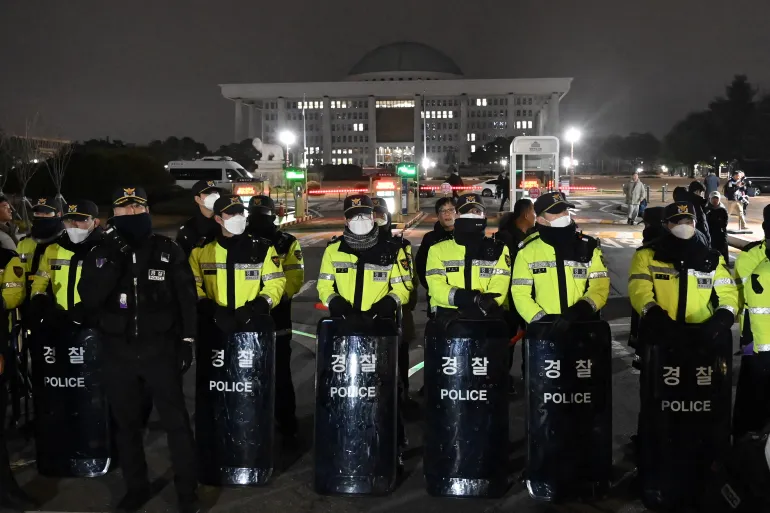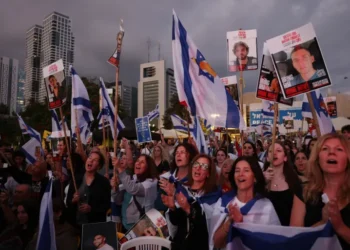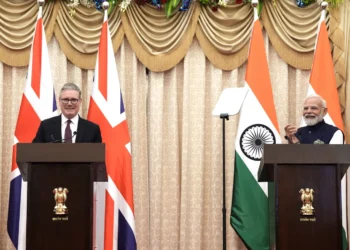President of South Korea, Yoon Suk-yeol has declared emergency martial law.
In an unannounced live televised address to the nation, the President asserted that the declaration of martial law is necessary to protect the country.
The surprise announcement was made as Yoon’s People Power Party and the main opposition Democratic Party bicker over next year’s budget.
“To safeguard a liberal South Korea from the threats posed by North Korea’s communist forces and to eliminate anti-state elements… I hereby declare emergency martial law.”
Yoon Suk-yeol
Yoon accused opposition lawmakers of cutting “all key budgets essential to the nation’s core functions, such as combatting drug crimes and maintaining public security, … turning the country into a drug haven and a state of public safety chaos.”
“With no regard for the livelihoods of the people, the opposition party has paralysed governance solely for the sake of impeachments, special investigations and shielding their leader from justice.”
Suk-yeol
He went on to label the opposition, which holds a majority in the 300-member parliament, as “antistate forces intent on overthrowing the regime” and called his decision “inevitable.”
He pledged to restore the country to normalcy by getting rid of “anti-state forces as soon as possible.”
It has been 45 years since such an order was issued.
South Korean authorities last declared martial law on October 26, 1979 following the assassination of President Park Chung-hee.
The measure extended to the capital, Seoul, and other major cities in an attempt to stabilise the chaotic political situation.
However, in May 1980, the South Korean military, led by Chun Doo-hwan, expanded martial law nationwide to consolidate power.
This led to the Gwangju Democratic Uprising — also known as the May 18 movement — which saw many civilians killed during the military crackdown.
Following Yoon’s declaration, the martial law Commander, General Park An-soo, announced a series of measures under the martial law declaration.
This includes prohibitions on all political activities, “including those of the National Assembly, local councils, political parties, and political associations, as well as assemblies [and] demonstrations,” and any acts that “deny or attempt to overthrow the liberal democratic system, as well as the dissemination of fake news, manipulation of public opinion, or false propaganda.”
He added all labour strikes and slowdowns, as well as “gatherings that incite social disorder.”
The order indicated that all media will be placed under the control of the Martial Law Command.
It also said that healthcare workers, including doctors who are currently on strike, must return to work within 48 hours or risk punishment.
“Violators of this proclamation will be subject to arrest, detention, and search and seizure without a warrant,” the Commander said.
Meanwhile, police were seen blocking access to National Assembly.

Opposition Leader Labels Martial Law Declaration As Unconstitutional
Lee Jae-myung, leader of the opposition Democratic Party, which has a majority in parliament, warned that “tanks, armoured personnel carriers and soldiers with guns and knives will rule the country.”
He said in a livestream, “The economy of the Republic of Korea will collapse irretrievably. My fellow citizens, please come to the National Assembly.”
South Korean news agency, Yonhap reported that the Democratic Party ordered its lawmakers to hold talks “to apparently discuss and begin the necessary procedures for lifting the martial law.”
Separately, Han Dong-hoon, who heads Yoon’s conservative People Power Party, called the decision to impose martial law “wrong.”
He pledged to “stop it with the people.”
Seoul Mayor, Oh Se-hoon, also noted on Facebook, “I oppose martial law,” adding that the law must be withdrawn.
READ ALSO: IMF Applauds Ghana’s Fiscal Progress, On Track for 0.5% Primary Surplus





















